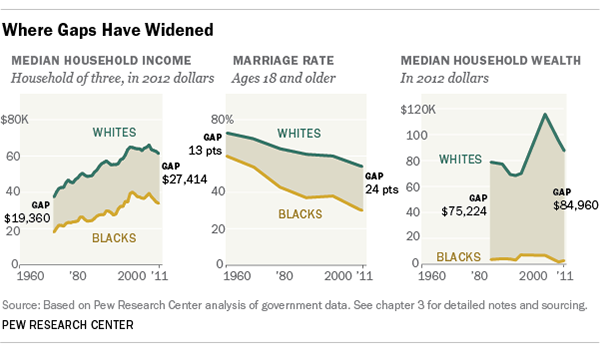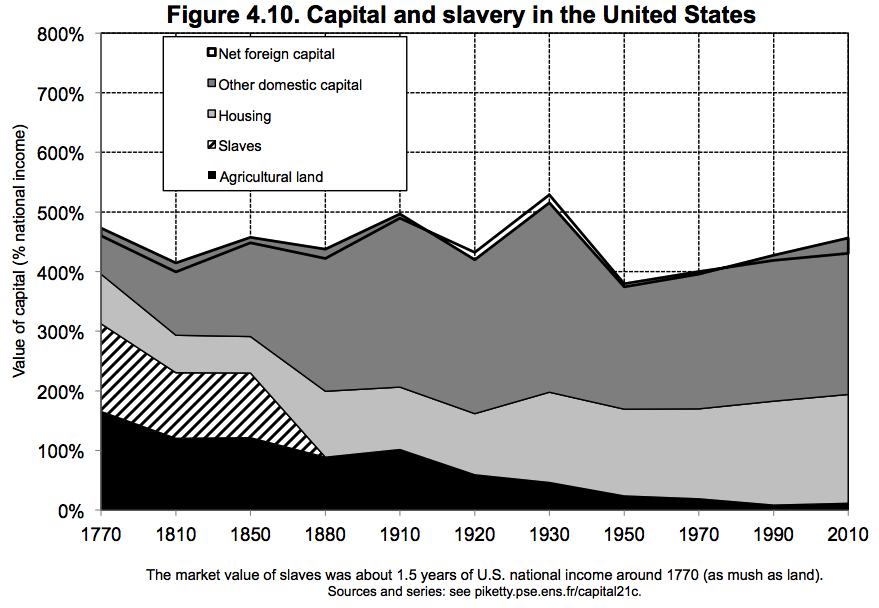Here's a simple and practical article for you to read OP. Mods should make a sticky post for this. Cause I'm tired of hearing about how this would never work and how it would cost too much money.
Slavery reparations are workable and affordable
Slavery reparations are workable and affordable
Matthew Yglesias
Ta-Nehisi Coates'
essay on "The Case for Reparations" is much more a call for a moral reckoning with the legacy of white supremacy in America than it is a detailed accounting of what a reparations policy would look like. The more wonkishly inclined might prefer a specific proposal, so here's a place to start: we could close the wealth gap between black households and white households by directing the Federal Reserve to print $55 billion a month for 25 months and divide the proceeds evenly among every African-American.
The black-white wealth gap
Attempting to reckon with vast historical crimes played out over multiple centuries is hard. It's better to start at the end — with a desirable outcome. What would it take to close the gap in wealth between black and white households?
Unfortunately for the cause of precision, in the United States wealth is measured at the household level while race is a property of individuals. But roughly speaking, the average American household has 2.55 people so closing the $85,000 household wealth gap would require a transfer of approximately $33,300 to each African American individual. There are about 41.4 million black people in America, so we're talking about approximately $1.38 trillion.
Isn't that an awful lot of money?
It is. But it's a tiny fraction of what was actually stolen.
In his book
Capital in the 21st Century, Thomas Piketty shows that in the decade before the civil war, the total value of black people held in bondage was about 100% of national income. Indeed, with the application of considerations related to compound interest it is possible to
derive figures into the quadrillionsas the appropriate recompense. And that's just slavery. As Coates shows, the economic damage of white supremacy continued unabated well into the second half of the twentieth century.
By contrast, national income in 2013 was $16.8 trillion so the idea of transferring $1.38 trillion to black Americans to close the racial wealth gap is far from crazy relative to the magnitude of the crime.
The appropriate payor is the United States government
Who would pay the $1.38 trillion?
It is obviously not practical to collect $1.38 trillion from individual white households. But more broadly, the issue is not individual acts of wrongdoing but a collective American legacy. The appropriate payor is the United States government which, conveniently, has the ability to print United States dollars in unlimited quantities.
The Federal Reserve Act would not, as written, allow the Fed to print $1.38 trillion and transfer it to individual African-Americans. But a reparations initiative could direct them to do so.
Wouldn't that destroy the economy?
Probably not. Right now the Federal Reserve is engaging in $45 billion per month of
quantitative easing, printing money and using the proceeds to buy US government debt and Fannie Mae and Freddie Mac bonds. Before May, they were doing $55 billion per month.
At the $55 billion per month pace, it would take 25 months — just over two years — to transfer the full $1.38 trillion to black America. Any potentially inflationary impact of the money-printing could be offset by halting quantitative easing immediately. If that's not enough to fully offset the impact, that would actually be good news since as Minneapolis Federal Reserve Bank President Narayan Kockerlakota observed earlier this week the Fed is
currently generating less inflation and less job growth than it says it wants. If at some point during the two year span inflation did become undesirably high, the Fed could offset that by increasing the
interest rate it pays on excess bank reserves or through
conventional monetary means.
Could you really rectify centuries of racial injustice this easily?
Sadly, no. Even if the racial gap in median wealth were eliminated, it would still be the case that there's a substantial racial gap in median income. Lurking behind that gap is a gap in educational attainment. Unless those were rectified, the racial wealth gap would reemerge over time.
Beyond that, equalizing financial wealth would hardly level the overall playing field. Formally discriminatory public policies are a thing of the past, and public discourse is increasingly intolerant of blatant displays of racism but
many studies show African-Americans are disadvantaged by widespread (and often unconscious) biases in a range of contexts.
Monetary reparations are generally viewed as an extreme idea, but the reality is that financial leveling is one of the aspects of racial inequality that it would
easiest to fix if the country wanted to.
 .
.  .
.  . This country has so much damn debt, I don't know how it's even possible, but that's another side note. How much are we talking that's gonna put us at a higher threshold with everybody else?
. This country has so much damn debt, I don't know how it's even possible, but that's another side note. How much are we talking that's gonna put us at a higher threshold with everybody else? Reparations is supposed to put us in middle to upper middle class, equal with everybody else, so it shouldn't come cheap. Payment for College is a start, but college don't guarantee everything. To build up, you also need assets, something like a house. So right now I'm at enough money for College + House. That's not even including investments to start businesses. How much are we talking here?
Reparations is supposed to put us in middle to upper middle class, equal with everybody else, so it shouldn't come cheap. Payment for College is a start, but college don't guarantee everything. To build up, you also need assets, something like a house. So right now I'm at enough money for College + House. That's not even including investments to start businesses. How much are we talking here?  . This country has so much damn debt, I don't know how it's even possible, but that's another side note. How much are we talking that's gonna put us at a higher threshold with everybody else?
. This country has so much damn debt, I don't know how it's even possible, but that's another side note. How much are we talking that's gonna put us at a higher threshold with everybody else? Reparations is supposed to put us in middle to upper middle class, equal with everybody else, so it shouldn't come cheap. Payment for College is a start, but college don't guarantee everything. To build up, you also need assets, something like a house. So right now I'm at enough money for College + House. That's not even including investments to start businesses. How much are we talking here?
Reparations is supposed to put us in middle to upper middle class, equal with everybody else, so it shouldn't come cheap. Payment for College is a start, but college don't guarantee everything. To build up, you also need assets, something like a house. So right now I'm at enough money for College + House. That's not even including investments to start businesses. How much are we talking here?  What about $1 million each
What about $1 million each 
 That's a start. I remember reading that part of the german reparations included a stipulation that people affected should be provided with enough resources to live off of without any external assistance. Part of the reparations also included the funding of agencies, toward land and infrastructure; also for payment of industrial and capital. Not only did the people receive compensation for the damage inflicted. But there was money in a pot that went toward buildings, machinery, labor and funding entire communities.
That's a start. I remember reading that part of the german reparations included a stipulation that people affected should be provided with enough resources to live off of without any external assistance. Part of the reparations also included the funding of agencies, toward land and infrastructure; also for payment of industrial and capital. Not only did the people receive compensation for the damage inflicted. But there was money in a pot that went toward buildings, machinery, labor and funding entire communities. and me -an old research paper that I saved in my gmail account where I used an Oxford Scholarship publication on The Handbook of German Reparations, US- Jewish settlements proceeds where the Jews sued for damages and some other references.
and me -an old research paper that I saved in my gmail account where I used an Oxford Scholarship publication on The Handbook of German Reparations, US- Jewish settlements proceeds where the Jews sued for damages and some other references.



